外研(新标准)版 八年级上 Module 12 Help>Unit 1 What should we do before help arrives?教学课件
文档属性
| 名称 | 外研(新标准)版 八年级上 Module 12 Help>Unit 1 What should we do before help arrives?教学课件 |
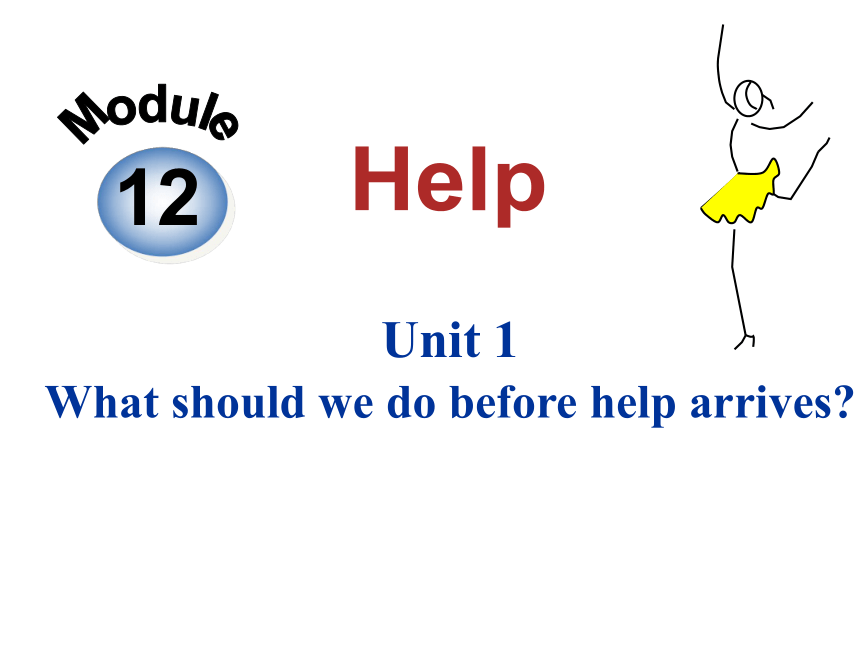
|
|
| 格式 | zip | ||
| 文件大小 | 1.6MB | ||
| 资源类型 | 教案 | ||
| 版本资源 | 外研版 | ||
| 科目 | 英语 | ||
| 更新时间 | 2013-12-25 00:00:00 | ||
图片预览



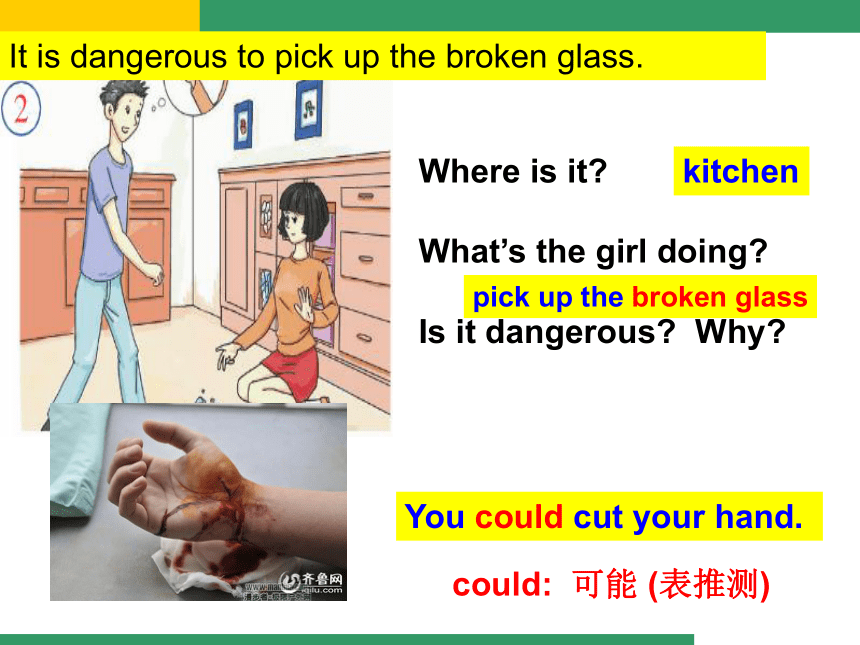
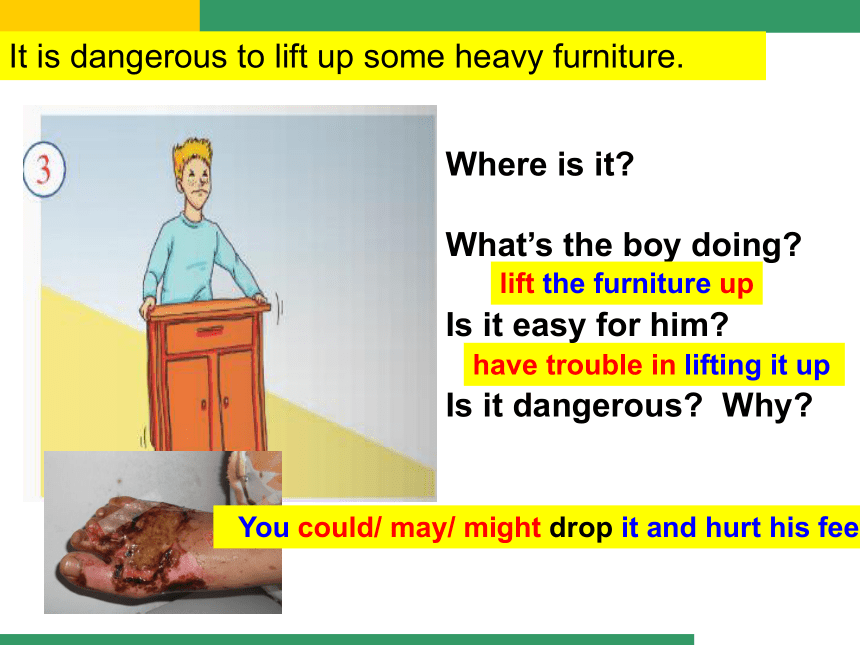
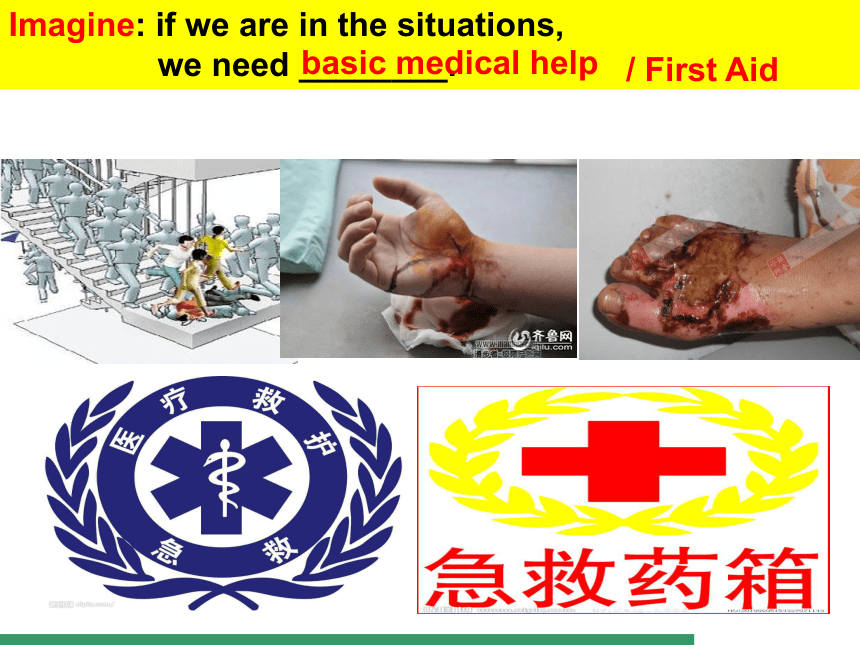
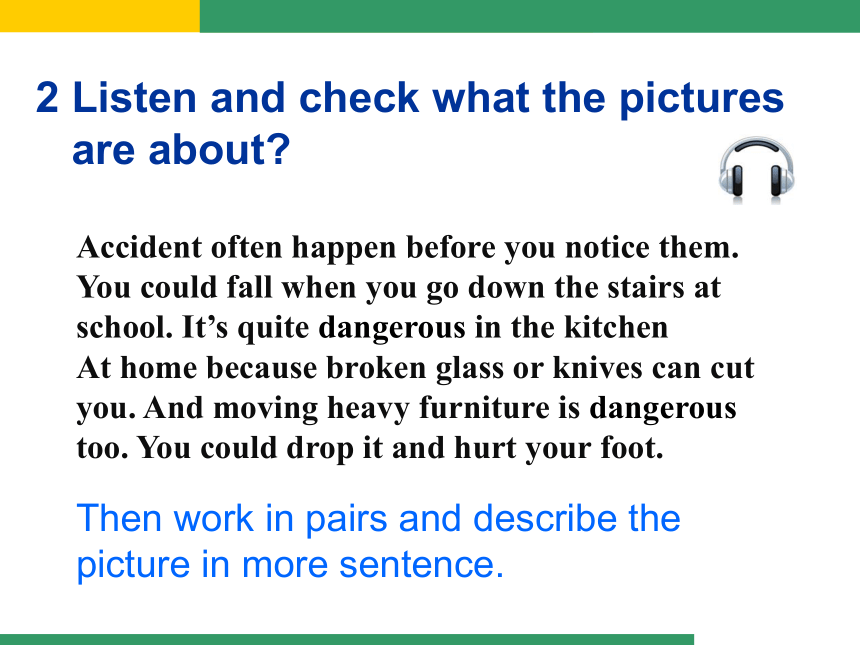
文档简介
课件18张PPT。12HelpModuleUnit 1
What should we do before help arrives?
1 work in pairs. Talk about the pictures.
Use the words in the box to help you.accident broken dangerous
furniture glass kitchen stairsIt’s dangerous to run down the stairs imagine you are the boy Where is it?
What’s the boy doing?
Is it dangerous? Why?at the bottom of the stair fall down on the stairs stand in a linepick up the broken glasskitchenIt is dangerous to pick up the broken glass.Where is it?
What’s the girl doing?
Is it dangerous? Why?You could cut your hand.could: 可能 (表推测)It is dangerous to lift up some heavy furniture.have trouble in lifting it up Where is it?
What’s the boy doing?
Is it easy for him?
Is it dangerous? Why?lift the furniture up You could/ may/ might drop it and hurt his feetImagine: if we are in the situations,
we need ________.basic medical help/ First Aid2 Listen and check what the pictures
are about?Accident often happen before you notice them. You could fall when you go down the stairs at school. It’s quite dangerous in the kitchen
At home because broken glass or knives can cut you. And moving heavy furniture is dangerous too. You could drop it and hurt your foot.Then work in pairs and describe the picture in more sentence. Listen and answer.1. What's the conversation about?
A. A traffic about an traffic accident
B. A class about how to give first aid
2. Why did Betty must know how to make people
comfortable?
Because she did some ___________.
3. What' s Betty's advice?
A. Lift him up and sit him on a chair
B. Make sure he's warm. Cover him with a coat.BBbasic medical trainingNow read these first aid suggestions
and decide if they are good ideas (√)
or bad ideas (×).
1 Ask the boy what is wrong.
2 Get help.
3 Shout so the boy can hear you.
4 Move the boy to a more comfortable place.
5 Make sure the boy is warm.×√√×√祈使句:表示 劝告,禁止,建议,请求或命令等。
一般以动词原形开始,否定句以 Don't …开头。1. 请等一下!
2. 不要使用电梯!
3. 再也不要Wait a moment!
Don't use the lift!
Never be late again!Don't moveDon't Shout because he could have trouble hearing you.Enjoy Reading Ms James: This morning’s class is about first aid, or
giving someone basic medical help. Let’s imagine an
accident. A boy is lying at the bottom of the stairs.
He isn’t moving or making a sound. He is in pain.
What can we do to help him?
Betty: First of all, find out what’s wrong with him.
Ms James: How do we do that?
Betty: Ask him.
Ms James: Ok. But he could have trouble hearing
you or speaking to you.
Lingling: Shout for help? Call 120? Listen and read.find out
查明;发现;找到Ms James: Good idea, but what should we do before
help arrives?
Tony: Make him comfortable.
Ms James: And how can we do that?
Tony: Lift him up and sit him on a chair?
Ms James: No, that could be harmful! You could
drop him and hurt him even more. Betty, you must
know! You did some basic medical training.
Betty: Make sure he’s warm. Cover him with a coat.
Ms James: That’s such good advice that you could
be a doctor, Betty!4 Complete the passagebottom Cover drop harmful imagine lift
medical pain Let’s (1) _______ you see a boy lying at the(2)________ of the stairs. What should you do? Call for (3) ________ help immediately. Do not (4)_____ the boy up and sit him on a chair. This could be (5) ________ for him! Even worse, you might (6)______ him while you are moving him! That would cause a lot of (7)_____. (8)______ him with a coat and make sure he is warm. Then wait for the doctors to arrive.imaginebottommedicalliftharmfuldroppainCoverUseful expressionsfirst aid
basic medical help
at the bottom of
be in pain
First of all
find out
What's wrong with him?
What do we do?
= How do we do that?
have trouble in doing
shout for / ask for help
lift up
do some medical training
make sure
cover sb with sth
such…that
so … that急救/ 基本的医疗帮助
在…底部
处于疼痛中
首先
找出/找到
他怎么了
我们能做什么
我们怎么做
做…有困难
请求 帮助
抬起…
做医疗培训
确保
用…覆盖
如此…以至于…我们学习过情态动词can和could表示“能够”,表示对现在或将来的推测,意为“会,可能”,往往用于否定句和疑问句。用于疑问句时,can比could表示的“可能性”要大;用于否定句时,cannot (can’t) 表示“不可能”。如:
You can’t be serious!
你不是认真的吧!
could则可用于肯定句、否定句和疑问句。在以下例句中,can和could均表示可能:
He could be in pain.他可能很疼。
That could be harmful!那可能有害!
Can/Could this be true?这有可能是真的吗?情态动词must, can, could表示推测情态动词must也可以表示猜测,意思为“一定,准是”,通常只用于肯定句。如课文中的 例子:
Betty, you must know!贝蒂,你肯定知道!
请仔细对比下列一组句子:
Who sent the present? Can it be your brother?
是谁送来的礼物啊?会是你哥哥吗? (询问 可能性)
It must be your brother. I saw him in your room just now.
肯定是你哥哥,我刚才看见他在 你的房间里。
(语气强烈,表示非常肯定)
It can't be my brother. He is still in France.
不可能是我哥哥,他还在法国呢。(表示不可能)1.?John?______?be?a?policeman.?He?is?much?too?short. A.?may?B.?mustn’t?C.?should?D.?can’t
2.?It?is?cold?in?the?room.?They?______?have?turned?off?
the?heating. A.?must? B.?ought?to ?C.?should ?D.?could
3.?—?Someone?is?knocking?at?the?door. —?Who?______?it?be?? A.?may?B.?can?C.?must?D.?should
4. They _______ still win – the game isn’t over yet. A. could B. mustn’t C. should D must DAB单项选择A4. That’s such good advice that you could be a doctor, 这个建议非常好,你都可以当医生了!
such... that...这个句型表达“如此…以至于…”的意思,such后面接名词,名词前可以有形容词修饰。如果只有形容词或副词,则要使用so...that...这一句型。如: It is such a small kitchen that only one person can cook in it.
这个厨房很小,只能容下 一个人在里面做饭。
They are such nice people that we all like them.
他们人很好,我们都喜欢他们。
He was so weak that he could hardly stand up.
他很虚弱,几乎站不起来。
Everything happened so quickly that I hadn’t time to think.
一切发生得太快 了,我都 没有时间思考。
What should we do before help arrives?
1 work in pairs. Talk about the pictures.
Use the words in the box to help you.accident broken dangerous
furniture glass kitchen stairsIt’s dangerous to run down the stairs imagine you are the boy Where is it?
What’s the boy doing?
Is it dangerous? Why?at the bottom of the stair fall down on the stairs stand in a linepick up the broken glasskitchenIt is dangerous to pick up the broken glass.Where is it?
What’s the girl doing?
Is it dangerous? Why?You could cut your hand.could: 可能 (表推测)It is dangerous to lift up some heavy furniture.have trouble in lifting it up Where is it?
What’s the boy doing?
Is it easy for him?
Is it dangerous? Why?lift the furniture up You could/ may/ might drop it and hurt his feetImagine: if we are in the situations,
we need ________.basic medical help/ First Aid2 Listen and check what the pictures
are about?Accident often happen before you notice them. You could fall when you go down the stairs at school. It’s quite dangerous in the kitchen
At home because broken glass or knives can cut you. And moving heavy furniture is dangerous too. You could drop it and hurt your foot.Then work in pairs and describe the picture in more sentence. Listen and answer.1. What's the conversation about?
A. A traffic about an traffic accident
B. A class about how to give first aid
2. Why did Betty must know how to make people
comfortable?
Because she did some ___________.
3. What' s Betty's advice?
A. Lift him up and sit him on a chair
B. Make sure he's warm. Cover him with a coat.BBbasic medical trainingNow read these first aid suggestions
and decide if they are good ideas (√)
or bad ideas (×).
1 Ask the boy what is wrong.
2 Get help.
3 Shout so the boy can hear you.
4 Move the boy to a more comfortable place.
5 Make sure the boy is warm.×√√×√祈使句:表示 劝告,禁止,建议,请求或命令等。
一般以动词原形开始,否定句以 Don't …开头。1. 请等一下!
2. 不要使用电梯!
3. 再也不要Wait a moment!
Don't use the lift!
Never be late again!Don't moveDon't Shout because he could have trouble hearing you.Enjoy Reading Ms James: This morning’s class is about first aid, or
giving someone basic medical help. Let’s imagine an
accident. A boy is lying at the bottom of the stairs.
He isn’t moving or making a sound. He is in pain.
What can we do to help him?
Betty: First of all, find out what’s wrong with him.
Ms James: How do we do that?
Betty: Ask him.
Ms James: Ok. But he could have trouble hearing
you or speaking to you.
Lingling: Shout for help? Call 120? Listen and read.find out
查明;发现;找到Ms James: Good idea, but what should we do before
help arrives?
Tony: Make him comfortable.
Ms James: And how can we do that?
Tony: Lift him up and sit him on a chair?
Ms James: No, that could be harmful! You could
drop him and hurt him even more. Betty, you must
know! You did some basic medical training.
Betty: Make sure he’s warm. Cover him with a coat.
Ms James: That’s such good advice that you could
be a doctor, Betty!4 Complete the passagebottom Cover drop harmful imagine lift
medical pain Let’s (1) _______ you see a boy lying at the(2)________ of the stairs. What should you do? Call for (3) ________ help immediately. Do not (4)_____ the boy up and sit him on a chair. This could be (5) ________ for him! Even worse, you might (6)______ him while you are moving him! That would cause a lot of (7)_____. (8)______ him with a coat and make sure he is warm. Then wait for the doctors to arrive.imaginebottommedicalliftharmfuldroppainCoverUseful expressionsfirst aid
basic medical help
at the bottom of
be in pain
First of all
find out
What's wrong with him?
What do we do?
= How do we do that?
have trouble in doing
shout for / ask for help
lift up
do some medical training
make sure
cover sb with sth
such…that
so … that急救/ 基本的医疗帮助
在…底部
处于疼痛中
首先
找出/找到
他怎么了
我们能做什么
我们怎么做
做…有困难
请求 帮助
抬起…
做医疗培训
确保
用…覆盖
如此…以至于…我们学习过情态动词can和could表示“能够”,表示对现在或将来的推测,意为“会,可能”,往往用于否定句和疑问句。用于疑问句时,can比could表示的“可能性”要大;用于否定句时,cannot (can’t) 表示“不可能”。如:
You can’t be serious!
你不是认真的吧!
could则可用于肯定句、否定句和疑问句。在以下例句中,can和could均表示可能:
He could be in pain.他可能很疼。
That could be harmful!那可能有害!
Can/Could this be true?这有可能是真的吗?情态动词must, can, could表示推测情态动词must也可以表示猜测,意思为“一定,准是”,通常只用于肯定句。如课文中的 例子:
Betty, you must know!贝蒂,你肯定知道!
请仔细对比下列一组句子:
Who sent the present? Can it be your brother?
是谁送来的礼物啊?会是你哥哥吗? (询问 可能性)
It must be your brother. I saw him in your room just now.
肯定是你哥哥,我刚才看见他在 你的房间里。
(语气强烈,表示非常肯定)
It can't be my brother. He is still in France.
不可能是我哥哥,他还在法国呢。(表示不可能)1.?John?______?be?a?policeman.?He?is?much?too?short. A.?may?B.?mustn’t?C.?should?D.?can’t
2.?It?is?cold?in?the?room.?They?______?have?turned?off?
the?heating. A.?must? B.?ought?to ?C.?should ?D.?could
3.?—?Someone?is?knocking?at?the?door. —?Who?______?it?be?? A.?may?B.?can?C.?must?D.?should
4. They _______ still win – the game isn’t over yet. A. could B. mustn’t C. should D must DAB单项选择A4. That’s such good advice that you could be a doctor, 这个建议非常好,你都可以当医生了!
such... that...这个句型表达“如此…以至于…”的意思,such后面接名词,名词前可以有形容词修饰。如果只有形容词或副词,则要使用so...that...这一句型。如: It is such a small kitchen that only one person can cook in it.
这个厨房很小,只能容下 一个人在里面做饭。
They are such nice people that we all like them.
他们人很好,我们都喜欢他们。
He was so weak that he could hardly stand up.
他很虚弱,几乎站不起来。
Everything happened so quickly that I hadn’t time to think.
一切发生得太快 了,我都 没有时间思考。
同课章节目录
- Module 1 How to learn English
- Unit 1 Let's try to speak English as much as possi
- Unit 2 You should smile at her.
- Unit 3 Language in use .
- Module 2 My home town and my country
- Unit 1 It's taller than many other buildings.
- Unit 2 Cambridge is a beautiful city in the east o
- Unit 3 Language in use .
- Module 3 Sports.
- Unit 1 Nothing is more exciting than playing tenni
- Unit 2 This year we training more carefully.
- Unit 3 Language in use .
- Module 4 Planes, ships and trains .
- Unit 1 He lives the farthest from school.
- Unit 2 What is the best way to travel.
- Unit 3 Language in use .
- Module 5 Lao She Teahouse.
- Unit 1 I wanted to see the Beijing Opera.
- Unit 2 It descibes the changes in Chinese society.
- Unit 3 Language in use .
- Module 6 Animals in danger.
- Unit 1 It allows people to get closer to them .
- Unit 2 The WWF is working hard to save them all.
- Unit 3 Language in use .
- Revision module A
- Module 7 A famous story
- Unit 1 Alice was sitting with her sister by the ri
- Unit 2 She was thinking about her cat.
- Unit 3 Language in use .
- Module 8 Accidents
- Unit 1 While the car were changing to red, a car s
- Unit 2 I was trying to pick it up when it bite me
- Unit 3 Language in use .
- Module 9 Population
- Unit 1 The population of China is about 1.37 billi
- Unit 2 Arnwick was a city with 200,000 people.
- Unit 3 Language in use .
- Module 10 The weathe
- Unit 1 It might snow.
- Unit 2 The weather is fine all year round.
- Unit 3 Language in use .
- Module 11 Way of life
- Unit 1 In China ,we open a gift later.
- Unit 2 In England, you usually drink tea with milk
- Unit 3 Language in use .
- Module 12 Help
- Unit 1 What should we do before help arrives?
- Unit 2 Stay away from windows and heavy furniture.
- Unit 3 Language in use .
- Revision module B
